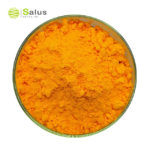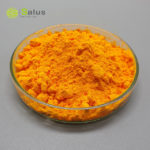
86-29-63699260 / +86-137-5995-3739

Sale@salusnutra.com


CAS Number:303-98-0
EINECS No:206-147-9
Empirical Formula (Hill Notation):C59H90O4
Specification:USP Grade
Package:25Kg/Drum
Drum’s Size:36cm*36cm*52cm
Shelf Time:2 Years
Description
FOS are used primarily as a low-calorie, alternative sweetener. People can eat and drink products made with FOS instead of those containing sugar, which spike glucose levels in the blood, and cause weight gain. FOS may also be preferable to artificial sweeteners, some of which have been linked to everything from weight gain, to diabetes.
|
ANALYSIS |
SPECIFICATION |
RESULTS |
|
Assay (Anhydrous basis) |
98.0%-101.0% |
USP<621> |
|
Decription |
Yellow-orange crystalline powder |
Visual |
|
Melting Point |
48℃-52℃ |
USP<741> |
|
Solubility |
Soluble in ether;trichlorotethane |
USP<1171> |
|
IR |
Sample spectrum consistent with the spectrum for USP Reference Standard |
USP<197K> |
|
Color reaction |
A blue color appears |
USP<197K> |
|
Sieve |
100%pass 80 mesh |
USP<786> |
|
90%pass 100 mesh |
USP<786> |
|
|
Tapped Density |
0.40g/ml~0.60g/ml |
USP<616> I |
|
Water(KF) |
≤0.2% |
USP<921> IC |
|
Residue on Ignition |
≤0.1% |
USP<281> |
|
Chromatographic Purity Coenzymes Q7,Q8,Q9,Q11 and related impurities |
≤1.0% |
USP<621> |
|
Ubidecarenone(2Z)-isomer and related impurities |
≤0.5% |
USP<621> |
|
Total impurities |
Total 1&2≤1.5% |
USP<621> |
|
Residual Solvents |
||
|
Methanol |
≤3000ppm |
USP<467> |
|
n-Hexane |
≤290ppm |
USP<467> |
|
Ethanol |
≤5000ppm |
USP<467> |
|
Isopropyl ether |
≤300 ppm |
USP<467> |
|
Heavy Metals |
||
|
Heavy Metal |
<10ppm |
USP<2232> |
|
As |
<1ppm |
USP<2232> |
|
Cd |
≤0.5ppm |
USP<2232> |
|
Pb |
≤ 0.5ppm |
USP<2232> |
|
Hg |
≤ 0.1ppm |
USP<2232> |
|
Microbial limit test |
||
|
Total Aerobic Microbial |
<1000cfu/g |
USP<2021> |
|
Yeast&Mold Count |
<50cfu/g |
USP<2021> |
|
E.Coli |
Absent/10g |
USP<2022> |
|
Salmonella |
Avsent/25g |
USP<2022> |
|
Bile-tolerant gram negative bacteria |
<1MPN/g |
USP<2021> |
|
Staphylococcus aureus |
Avsent/25g |
USP<2022> |
|
Pseudomonas aeruginosa |
Absent/10g |
USP<62> |
Why do people take CoQ10?
Although CoQ10 plays a key role in the body, most healthy people have enough CoQ10 naturally. There is some evidence that adding more — in the form of CoQ10 supplements — may be beneficial. Increasing age and some medical conditions are associated with dropping levels of CoQ10. But in these cases, it’s uncertain that adding CoQ10 will have an effect.
CoQ10 has been used to treat many different conditions. There’s evidence that CoQ10 supplements can lower blood pressure slightly. CoQ10 is also used to treat heart failure and other heart conditions, possibly helping to improve some symptoms and lessen future cardiac risks when combined with regular medications, but the evidence is conflicting.
Though still controversial, some preliminary evidence suggests that CoQ10 may help to prevent or treat the adverse effects, such as muscle pains and liver problems, of taking statin-type cholesterol drugs.
Who needs to take CoQ10?
CoQ10 is found to be helpful in those with congestive heart failure, cardiomyopathy, neurologic disorders such as Parkinson’s disease or Huntington’s disease, dysfunctional mitochondria, high blood pressure, migraine headaches, and those who have had a recent heart attack.
Should you take CoQ10 everyday?
Typically, 90–200 mg of CoQ10 per day are recommended, though some conditions may require higher dosages of 300–600 mg. CoQ10 is a relatively well-tolerated and safe supplement that may benefit a wide variety of people looking for a natural way to boost health.

Send Message +
© 2021 www.salusnutra.com All Rights Reserve